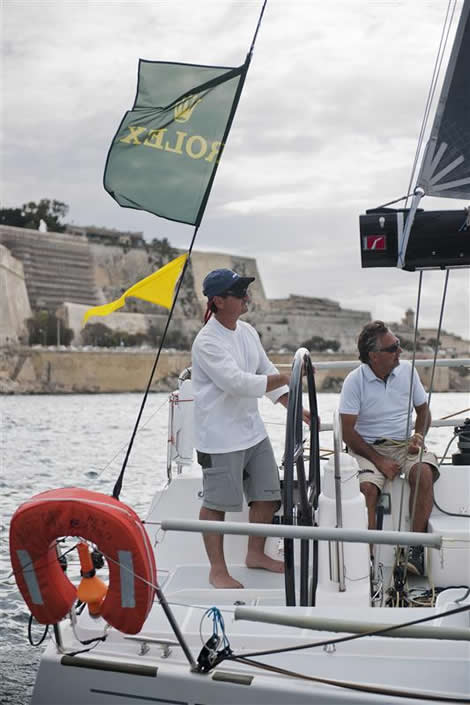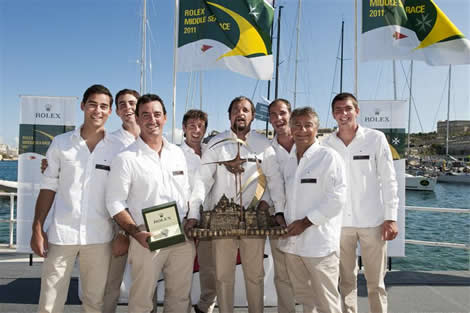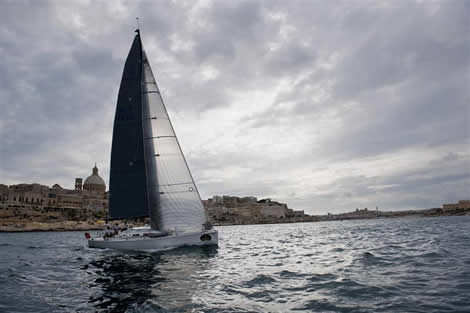
Hometown victory
Putting an end to the drought of Maltese winners, the J/122 Artie, co-skippered by Lee Satariano and Christian Ripard, was named the overall winner of the 2011 Rolex Middle Sea Race today. Artie completed the 606-nautical mile course in an elapsed time of 4 days, 4 hours, 22 minutes, 54 seconds. The last time a local boat won this ocean classic was in 2002 when the 35 footer, Market Wizard took top honours.
This year’s race once again proved it could be a small boat affair with the top three boats – Artie, AOC Rockall (the German Corby 36), and Otra Vez (another Maltese J/122) – all under 40 feet. Since 2002 half of the overall winners have been drawn from the most competitive maxi and mini-maxis around including Rambler, Morning Glory, Nokia, Alegre and Atalanta II, all ranging in size from 65 to 90 feet in length and suggesting a big boat bias. Artie has redressed the balance a little.
After finishing second overall in 2006 and 2010, owner Lee Satariano was clearly pleased with his first overall win: “It’s a moment to enjoy – it is a dream come true. Since 2002 the fleet has grown bigger, the competition is tremendous. The Rolex Middle Sea Race is a beautiful track. The race is one you can never forget – every year something challenges you to go back out and enjoy the race.”
Satariano was quick to credit Ripard and the rest of his crew and said: “They have been preparing the boat the whole year and have been dedicated to the local races. The preparation for this race was even more and more intense - a lot of effort went into optimising the boat and sails. During the race the crew worked round the clock, sometimes there were five to seven sail changes in ten minutes; they worked fast, and in any conditions. It was very nice for them to do so well in such a race.”
As to what made this year’s race unique, aside from the obvious winning, he added: “Every corner had something we weren’t expecting – you were expecting one thing and then obviously facing different winds, rain, different directions, but it was totally exciting.”
The only mis-step the crew of Artie experienced was during the first night off the southeast coast of Sicily, when they realised there was a problem in accessing the race tracker, a glitch they never resolved. Ripard said: “But psychologically it let us get on with the job and I think it helped. We could (visually) see our closest rivals, so we had motivation to keep the boat moving.”
Artie's crew followed the pre-race forecast, but the boats that were inshore of them sailed through and Artie ended up towards the back of the fleet. The crew knew they were doing badly when they found themselves with boats they knew they should be in front of. Satariano said: “From there we worked even harder to regain that loss on the first night.“
Co-skipper and helmsman Christian Ripard recounting their overall race, offered: “It was tough mentally. There were a lot of tactical decisions constantly, and you had to make the right decisions. We were close to up to 30 yachts, racing among a big fleet, so it was a very tactical race. The first night was very difficult as there were patches of no wind. The next morning we came out of it badly, so we had the whole rest of the race on catch-up mode. But that gave us fuel not to slip up. Looking back, I think we did quite well. We pushed the boat as hard as she’d go.”
The top five finishers – Artie, AOC Rockall, Otra Vez, Jaru Team EC (MLT), Oiltanking Juno (MLT) – crossed paths all the way around the race course. Ripard said: “We really fought each other all the way around going through the fleet. They had the same problem the first night (being too far west) and worked our way through the fleet. They kept popping up and we always seemed to end up at the corners together.”
Beside Ripard and Satariano, Artie’s eight-man crew includes three 20-year olds, Ripard said: “It proves the Maltese sailors may not be ‘rock star’ professionals, but they can deliver and muck in with the best. This race wasn’t a fluke – last year we pressed hard and we went back and proved the boys could do it.”
Ripard worked to keep the crew focused on the race at hand: “I try to keep everyone refraining from getting outside news, it makes everyone too excited, you get on edge, but 30 miles from the finish, we started to get the news as to our position.”

At that point Artie was on the leg from Lampedusa to Gozo, and Ripard continued “the wind was very light, everyone was in the same wind. We knew it would come in from the west-northwest. It sure did, but the boats behind us were to the west of us, so they came in with the wind. Jaru was maybe seven miles behind us, just a dot on the horizon, when we were coming into the (South Comino) channel, and we finished about a ½ mile in front, so they were coming up with the breeze. So it was very difficult coming down the coast, it was very difficult as the wind wasn’t there for us. We made it to the finish just in time.”
Besides a race with the J/133 Jaru, both boat-for-boat and on corrected time, Artie was also racing the clock against Chris Opielok’s Corby 36 AOC Rockall (GER), which according ot the race tracking system was leading overall for a good part of the race. Once Artie finished, AOC Rockall had a two-hour window to cross the line. While it may have been achievable with the right conditions, this year the weather gods were not cooperating with the race newcomer. The Corby 36 crossed just before 18.00 local time, 29 minutes too late to unseat Artie from the winner’s perch.
Opielok has successfully campaigned AOC Rockall for the past two years, and has just recently sold the boat, but had committed to competing in the Rolex Middle Sea Race as a final race on board. He assembled a good competitive crew, which included tactician John Brinkers, former Royal Hong Kong Yacht Club commodore and Etchells racer Warwick Downs, and the yacht’s designer John Corby. With a crew member dropping out at the last minute, they sailed with seven which meant the watches were a bit short-handed with only three people per watch, and Opeilok supporting with weather, food, and manoeuvres,
Still, the overall result seems to have hardly diminished the German sailor's enthusiasm for the race, in which they placed second overall on corrected time and second in Class 4. Opielok said: “It was a beautiful, very lovely race. We had up to 20 knots of breeze, we had no wind, we had a bit of current, and an unpredictable weather forecast. For all of us it was our first race and we can claim it as the best offshore race ever -- we just loved it here.”
A professional offshore supply boat captain by trade who is well-versed in weather forecasting, nonetheless, this race proved challenging: “The global weather was pretty well forecast, but on the racecourse, it was interrupted by local weather systems: small deep flying cluster clouds, some thermal winds. Looking from the boat, it was totally different so we had to completely change our strategy. We decided not to go more than two miles from the rhumb line, we decided to sail deep into the clouds to have more pressure, and we took every wind shift. We also looked at the fleet tracker at the boats ahead and matched that up with the clouds, so we basically knew what was ahead, which was a big advantage for a small boat.”
Opielok reported no problems on board and foresaw a return to Malta: “The boat was like a snake through oil. I love this boat and really regret selling it, but I need a bit of time for my family and business. But, I swear, I’ll be back!”
As of 16.00 today, some dozen boats are still racing, most of them just approaching the islands of Gozo and Comino, a light northerly wind pushing them towards the finish. The final boats in the fleet are expected in by tomorrow evening.











Latest Comments
Add a comment - Members log in